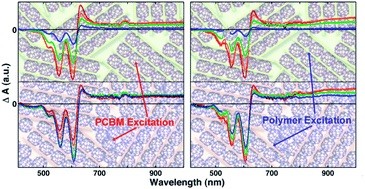The influence of microstructure on charge separation dynamics in organic bulk heterojunction materials for solar cell applications
Scarongella, M.; Paraecattil, A. A.; Buchaca-Domingo, E.; Douglas, J. D.; Beaupre, S.; McCarthy-Ward, T.; Heeney, M.; Moser, J. -E.; Leclerc, M.; Frechet, J. M. J.; Stingelin, N.; Banerji, N.
JOURNAL OF MATERIALS CHEMISTRY A
2014
Light-induced charge formation is essential for the generation of photocurrent in organic solar cells. In order to gain a better understanding of this complex process, we have investigated the femtosecond dynamics of charge separation upon selective excitation of either the fullerene or the polymer in different bulk heterojunction blends with well-characterized microstructure. Blends of the pBTTT and PBDTTPD polymers with PCBM gave us access to three different scenarios: either a single intermixed phase, an intermixed phase with additional pure PCBM clusters, or a three-phase microstructure of pure polymer aggregates, pure fullerene clusters and intermixed regions. We found that ultrafast charge separation (by electron or hole transfer) occurs predominantly in intermixed regions, while charges are generated more slowly from excitons in pure domains that require diffusion to a charge generation site. The pure domains are helpful to prevent geminate charge recombination, but they must be sufficiently small not to become exciton traps. By varying the polymer packing, backbone planarity and chain length, we have shown that exciton diffusion out of small polymer aggregates in the highly efficient PBDTTPD:PCBM blend occurs within the same chain and is helped by delocalization.


